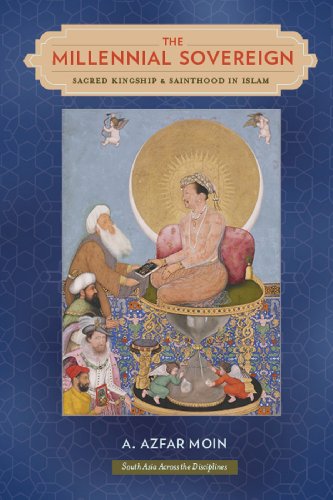Asfar Moin’s work, The Millennial Sovereign: Sacred Kingship and Sainthood in Islam is a study of the articulation of sovereignty in Mughal India. But in looking at sovereignty, he eschews textual narratives and focusses on the practices of sovereignty. So one of the departures this book makes is to move away from the theories to the practices of sovereign power. In looking at the practices of sovereignty, Moin develops the notion of sacred kingship arguing that the Mughal kingship was invested with sacrality. This has been suggested by other historians as well (for details refer to the works of S A A Rizvi, K A Nizami, J F Richards and others) but in looking at the articulation of sovereignty in sacred terms, these historians have focused on the textual theories and the literary culture.For instance, they have traced the origins of the reign of Akbar to Ibn Arabi’s concept of Wahdat ul Wajud or the metaphysical notion in the Indo-Islamic sufi writings as providing the backdrop to the sacred origins of Mughal kingship. Azfar Moin’s work, however, makes three central arguments; firstly, Muslim kingship was a combination of sainthood and monarchy.
Secondly, the sacred sovereignty drew its legitimacy from the early modern practices of astrology and alchemy and lastly, sacred kingship was connected to popular worldviews or belief systems.The Millennial Sovereign centers on Akbar’s reign (1156-1605) where legitimation of authority rested on a shared epistemic system—a shared resources of knowledge of India and Iran. Akbar’s father and grandfather, Humayun and Babur, had both sought refuge and military assistance from the Safavids at low points in their royal careers and had witnessed the workings of the Safavid court and the Sufi organization extremely closely. The Safavids, in turn had adopted the highly stylized forms and fashions of the latter-era Timurid courts as they evolved from a Sufi order into an imperial dynasty. Therefore, it was by no accident that in both these nascent empires a similar form of monarchy developed where apart from other things, there was an emphasis on astrology as shaping the political developments of the period. One of the central tropes that Moin’s work explores is the concept of Mehdi or a prophesied saviour, a figure who would set right the unbearable order of things and inaugurate a new era of peace and justice—The New Millennium. The theory of a human agent ushering in and maintaining the just religio-political order of a particular historical era was well known and manifested itself in various ways; the renewer (mujaddid), the mystical concepts of the pole or axis mundi (qutb) and the perfect individual (Insan-i Kamil).

